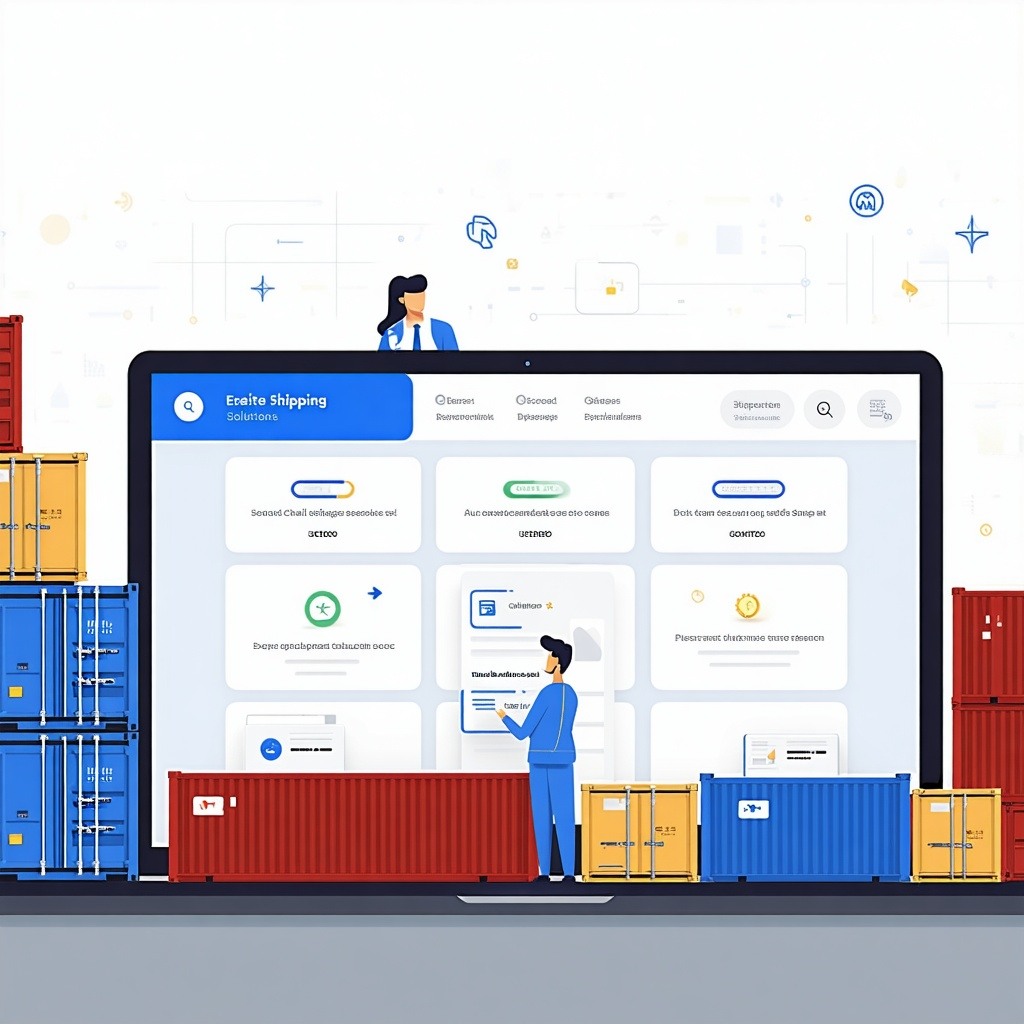Shipping Software for Wholesale & B2B Businesses: Challenges and Solutions

What we’ll cover
Introduction
Wholesale and B2B businesses operate on a massive scale, handling bulk shipments, complex order fulfillment, and strict delivery timelines. As supply chain networks expand and customer expectations evolve, optimizing shipping processes becomes a crucial factor in sustaining profitability and competitive advantage. Managing multiple warehouses, order management systems, and seamless integration with eCommerce platforms is a necessity.
With B2B eCommerce sales projected to exceed $4,600 billion by 2025, the demand for shipping software tailored for wholesale operations continues to rise. Businesses must navigate a landscape of increasing costs, fragmented carrier networks, and regulatory challenges, all while ensuring timely delivery and seamless order processing. The success of a wholesale business depends on its ability to efficiently manage inventory, logistics, and fulfillment at scale.
However, achieving this level of efficiency comes with its own set of challenges. From high freight costs to cross-border shipping complexities, the logistics involved in B2B transactions can be overwhelming. This article explores the major challenges in wholesale and B2B shipping. We also provide scalable solutions that businesses can adopt to enhance efficiency and reduce operational bottlenecks.
Key shipping challenges in the Wholesale & B2B Businesses and their solutions
Wholesale and B2B shipping presents a distinct set of challenges that differ from traditional retail logistics. Unlike direct-to-consumer shipping, B2B transactions involve bulk shipments, customized fulfillment needs, and stringent compliance regulations. Managing high-volume orders, optimizing freight costs, and ensuring timely cross-border shipping are just a few of the critical pain points businesses must overcome. Below, we break down the most pressing challenges in wholesale logistics and explore practical solutions that can help companies streamline their operations effectively.
🚨Challenge #1: Managing bulk orders with multiple fulfillment centers
Wholesale orders involve large shipment volumes that must be fulfilled across multiple warehouses and distribution centers. Without an efficient system in place, delays, misrouted packages, and inventory mismanagement can disrupt operations and impact customer satisfaction.
Issue: Wholesale orders involve large shipment volumes, often spread across multiple warehouses or distribution hubs, leading to delays and inefficiencies.
Processing bulk orders manually can create inefficiencies, particularly when inventory is spread across multiple locations. Businesses often struggle to determine the nearest warehouse with available stock. It leads to shipping delays and increased fulfillment costs. Additionally, coordinating shipments across various distribution centers increases the risk of order errors and shipping inefficiencies.
✅ Solutions
-
Automated bulk order processing: Implementing intelligent order routing systems ensures that orders are automatically assigned to the most suitable fulfillment center. It reduces transit time and costs.
-
Multi-warehouse management: Utilizing order management systems allows businesses to track inventory across all distribution points and allocate stock dynamically.
-
Batch label printing & freight consolidation: Streamlining label printing and consolidating shipments for bulk orders enhances fulfillment efficiency and reduces transportation expenses.
🚨Challenge #2: High freight costs & carrier selection issues
Shipping in the wholesale sector often requires LTL (Less-than-Truckload), FTL (Full-Truckload), and freight services. That makes cost optimization a challenge.
Issue: B2B shipments often rely on LTL (Less-than-Truckload), FTL (Full-Truckload), and freight services, making cost optimization difficult.
With freight charges fluctuating due to fuel costs, demand surges, and carrier capacity constraints, businesses struggle to maintain predictable shipping expenses. Additionally, choosing the wrong carrier can lead to higher shipping rates, delays, and damaged shipments. That affects supply chain efficiency.
✅ Solutions
-
AI-driven carrier selection: Smart shipping software automatically picks the most cost-effective carrier based on shipment size, weight, and destination.
-
Dynamic freight rate comparison: Businesses can compare real-time carrier pricing to secure the best rates and minimize transportation costs.
-
Route optimization for cost reduction: By optimizing delivery routes, businesses can reduce unnecessary mileage and improve transit efficiency.
🚨Challenge #3: Lack of shipment visibility & tracking for wholesale orders
B2B buyers expect real-time shipment tracking, yet traditional freight carriers often lack strong tracking solutions.
Issue: Wholesale buyers demand real-time tracking, but traditional freight carriers lack visibility solutions.
Wholesale shipments involve multiple touchpoints, making real-time tracking difficult. A lack of transparency leads to missed deliveries, lost shipments, and increased WISMO (Where Is My Order?) inquiries. Without centralized tracking, businesses struggle to keep customers informed. That affects the post-purchase customer experience.
✅ Solutions
-
Centralized B2B order tracking dashboard: A unified platform provides real-time visibility across all shipments, reducing errors and improving delivery coordination.
-
Automated buyer notifications: Businesses can set up automated notifications to keep customers informed about order status, minimizing tracking inquiries.
-
Custom tracking URLs: Offering branded tracking pages enhances customer engagement and promotes business credibility.
🚨Challenge #4: Handling recurring orders & long-term contracts
Many B2B businesses have standing purchase agreements and subscription-based supply models, requiring seamless logistics.
Issue: Many B2B businesses have standing purchase agreements requiring seamless shipping without manual intervention.
Manually managing recurring orders is inefficient and prone to inventory miscalculations and delivery delays. A lack of automated order management results in disruptions, missed fulfillment windows, and supplier dissatisfaction.
Solutions
-
Automated recurring order fulfillment: A dedicated fulfillment system ensures scheduled order processing without manual intervention.
-
Contract-based carrier assignments: Businesses can assign preferred carriers for long-term contracts. It helps secure better shipping rates and reliability.
-
Predictive inventory planning: AI-driven demand forecasting helps businesses anticipate inventory needs. That helps avoid stockouts and overstocking.
🚨Challenge #5: International wholesale shipping & cross-border regulations
Global expansion presents challenges related to customs clearance, duty fees, and compliance with international shipping laws.
Issue: Customs clearance, tax compliance, and duties create major roadblocks in B2B cross-border shipping.
Navigating cross-border regulations requires extensive paperwork, leading to customs delays and unexpected tax liabilities. Without an efficient import/export management system, businesses risk shipment hold-ups and financial penalties.
✅ Solutions
-
Automated import/export documentation: Generating digital customs documents speeds up clearance and reduces manual paperwork.
-
HS code & duty calculation integration: Smart classification ensures accurate tax calculations. It helps avoid costly compliance errors.
-
Multi-country carrier network: A diverse carrier network enables businesses to switch between domestic and international freight solutions with ease.
🚨Challenge #6: Handling B2B returns & reverse logistics
Wholesale returns are complex and costly, requiring an efficient reverse logistics strategy.
Issue: Managing returns at a large scale in wholesale logistics is challenging and costly.
Handling bulk product returns in wholesale transactions is labor-intensive. Without a structured return management system, businesses experience delayed restocking, higher operational costs, and potential inventory shrinkage.
✅ Solutions
-
Bulk returns management system: Automated return workflows streamline refunds, replacements, and restocking.
-
AI-powered return fraud prevention: Machine learning identifies fraudulent return claims, ensuring authenticity in the process.
-
Restocking & resale optimization: Businesses can reinstate returned goods faster. It helps them minimize revenue loss.
How ClickPost helps B2B & wholesale companies scale shipping automation?
ClickPost is a multi-carrier shipping software that can integrate with all sales channels and help B2B ecommerce stores and wholesale businesses with cost savings. Its B2B shipping solutions streamline bulk order fulfillment, enhance supply chain visibility, and automate shipment tracking for wholesalers and distributors. By integrating smart logistics automation, businesses can improve efficiency and reduce operational bottlenecks. Even in a B2B context you benefit from the Returns & Exchange feature set—which supports complex workflows including size/variant swaps and refund reversals.
ClickPost standout features:
-
Single dashboard for all orders: Centralized tracking for better order management.
-
Automated label generation: Reduces manual errors and enhances accuracy.
-
Smart carrier selection: AI-driven routing for cost-effective shipping.
-
Proof-of-Delivery (POD) integration: Ensures shipment authenticity and transparency.
With ClickPost, wholesale businesses can simplify logistics operations, lower costs, and enhance fulfillment accuracy. That helps with better order management and improves carrier performance to suit your business needs. From printing shipping labels to automated delivery notifications, ClickPost has got you covered.
Streamline your shipping experience with ClickPost

The final thoughts: The future of B2B shipping is smart logistics
The B2B and wholesale industry is evolving rapidly, and logistics management is at the heart of this transformation. By leveraging intelligent shipping software, businesses can optimize supply chain operations, reduce costs, and improve customer satisfaction.
Adopting automated logistics solutions is no longer a luxury but a necessity. In a landscape where efficiency, speed, and cost-effectiveness dictate success, investing in scalable fulfillment technology is the key to staying ahead. The future of B2B shipping belongs to businesses that embrace automation, data-driven logistics, and strategic carrier partnerships.


.png?width=879&height=549&name=Page%2074%20(1).png)